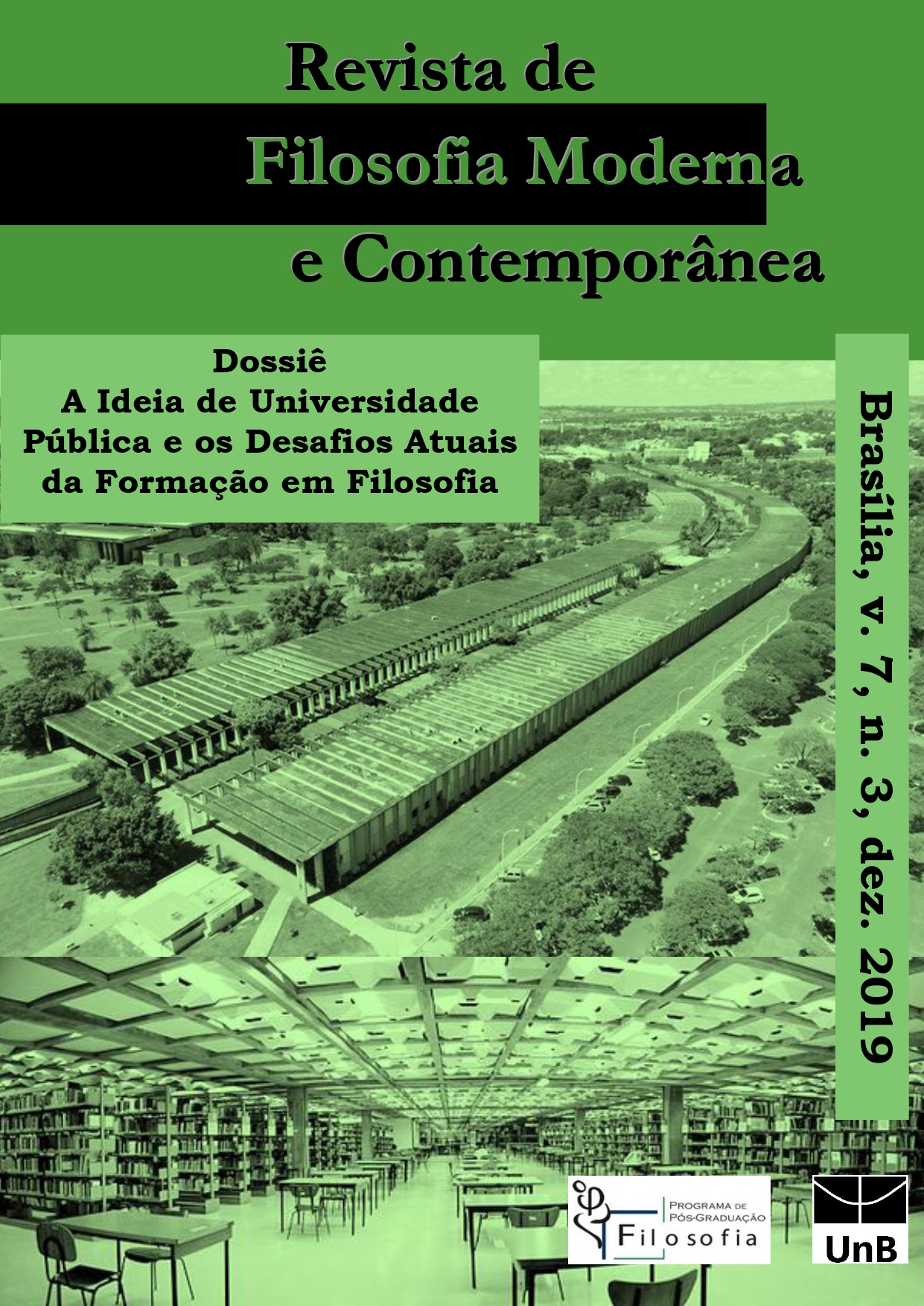Analiticidade e Sinteticidade: A Forma Judicativa do Conhecimento em Kant
DOI:
https://doi.org/10.26512/rfmc.v7i3.28858Palavras-chave:
distinção entre juízos analíticos e sintéticos; críticas à distinção kantiana; possibilidade de juízos sintéticos a priori; sensibilidade e entendimento; dedução das categorias.Resumo
Este trabalho aborda a distinção entre juízos analíticos e sintéticos como fundamento sistemático de estruturação da epistemologia kantiana. Inicialmente, são considerados a formulação e os exemplos dessa distinção. Depois, são ponderadas as críticas de Eberhard, Lovejoy, Quine e White. Por fim, é discutida a originalidade da posição kantiana quanto à distinção em questão e à possibilidade de juízos sintéticos a priori. A conclusão apresentada é a de que a originalidade da posição kantiana repousa nos dois elementos que fundamentam a sua teoria do conhecimento: a autossuficiência originária das faculdades do entendimento e da sensibilidade e a sua correlação necessária no que concerne à fundamentação do conhecimento humano.
Downloads
Referências
ALLISON, Henry E. The Kant-Eberhard controversy. Baltimore and London: The Johns Hopkins University Press, 1973.
_____. “Reflections on the B-Deduction”. The southern journal of philosophy, vol. 25, p. 1-16, 1987.
_____. “The originality of Kant's distinction between analytic and synthetic judgments”. In: CHADWICK, Rutf; CAZEAUX, Clive. Immanuel Kant: critical assessments. London: Routledge, 1992. p. 324-346.
_____. Kant’s transcendental deduction: an analytical-historical commentary. New York: Oxford University Press, 2015.
ARISTÓTELES. Metafísica. Trad. Edson Bini. 2. ed. São Paulo: Edipro, 2012.
CAIMI, Mario. “A versão definitiva da dedução transcendental das categorias na primeira edição da Crítica da razão pura”. In: Joel Thiago (Org.). Comentários à s obras de Kant: Crítica da razão pura. Florianópolis: Nefiponline, 2012. p. 249-286.
CARL, Wolfgang. “Kant’s first drafts of the deduction of the categories”. In: FÖRSTER, Eckart (Ed.). Kant's transcendental deductions: the three critiques and the opus postumum. Stanford: Stanford University Press, 1989.
CAYGILL, Howard. Dicionário Kant. Oxford: Blackwell Publishing, 1995. 353 p. Tradução de: Álvaro Cabral.
CORDON, Manuel Juan; MARTINEZ, Tomas Calvo. História da filosofia: dos pré-socráticos à filosofia contemporânea. Lisboa: Edições 70, 2014.
DA FONSECA, Pedro Manuel Cabral. “A possibilidade dos juízos sintéticos a priori na Crítica da razão pura”. Disponível em: < http://www.pedro-fonseca.com/pt/filosofia/kant.pdf>. Acesso em: 04 dez. 2019.
DA SILVEIRA, Fernando Lang. “A teoria do conhecimento de Kant: o idealismo transcendental”. Caderno brasileiro do ensino de física, v.19, p. 28-51, 2002.
FAGGION, Andrea Luisa Bucchile. “Dedução transcendental das categorias do entendimento: um embate entre ceticismo e criticismo”. Sképsis, n. 3-4, p. 119-137, 2008.
HANNA, Robert. Kant e os fundamentos da filosofia analítica. Trad. Leila Souza Mendes. São Leopoldo: Unisinos, 2013.
HÖFFE, Otfried. Immanuel Kant. Trad. Christian Viktor Hamm e Valerio Rohden. São Paulo: Martins Fontes, 2005.
KANT, Immanuel. Crítica da razão pura (KrV). Trad. Fernando de Costa Mattos. 4. ed. Petrópolis: Vozes, 2015.
LEIBNIZ, Wilhelm Gottfried. Ensaios de teodiceia. Trad. William de Siqueira Piauí e Juliana Cecci Silva. São Paulo: Estação liberdade, 2013.
LOCKE, John. Ensaio acerca do entendimento humano. Trad. Anoar Aiex. São Paulo: Abril Cultural, 1973.
LOVEJOY, Arthur Oncken. “Kant’s antithesis of dogmatism and criticism”. Mind, vol. 15, n. 58, p. 191-214, 1906.
PIMENTA, Olavo Calábria. Elementos fundamentais da analítica transcendental de Kant. 2003. 157 f. Dissertação (Mestrado) - Curso de Filosofia, Universidade Estadual de Campinas, Campinas, 2003.
_____. “A distinção kantiana entre aparecimento e fenômeno”. Kant E-Prints, v. 1, n. 01, p. 119-126, 2006.
QUINE, Willard Van Orman. “Dois dogmas do empirismo”. In: _____. De um ponto de vista lógico. São Paulo: UNESP, 2011. p. 37-69.
REGO, Pedro Costa. “A dedução transcendental B: objetivo e método”. In: Joel Thiago (Org.). Comentários à s obras de Kant: Crítica da razão pura. Florianópolis: Nefiponline, 2012. p. 287-318.
WHITE, Morton G. “The analytic and the synthetic: an untenable dualism”. In: HOOK, Sidney (Ed.). John Dewey: philosopher of science and freedom. New York: The Dial Press, 1950, p. 316”“330.
Downloads
Publicado
Edição
Seção
Licença
Direitos Autorais para artigos publicados nesta revista são do autor, com direitos da primeira publicação para a revista. Em virtude dos artigos aparecerem nesta revista de acesso público, os artigos são de uso gratuito, com atribuições próprias, em aplicações educacionais e não-comerciais.


